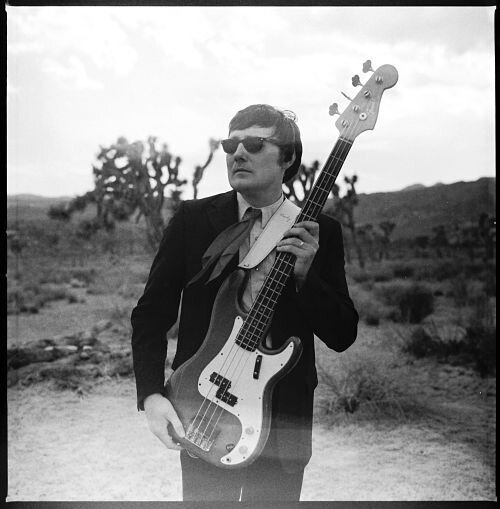Chris Scruggs (Marty Stuart, Rosie Flores)


Photo by Alysse Gafkjen
By Joe Gagliardo
To understand Chris Scruggs’ career, it is important to understand country and pop music history!
Chris’ mom, Gail Davies, is an accomplished singer / songwriter and was the first female record producer in the history of country music. She duetted with Roger Miller, Ralph Stanley, and her bass players on record included such studio legends as Leland Sklar and Willie Weeks.
Chris’ maternal grandfather is the late country singer Tex Dickerson, and his paternal grandfather is bluegrass banjo legend, Earl Scruggs. Simply put, Chris grew up surrounded by music, and great singers and players!
After seeing A Hard Day’s Night at age eleven, Chris decided that wanted to play guitar and two years later, he added bass. His first instrument was an Aria Pro Cardinal Series bass. After it was stolen, Chris moved to a 70’s Fender Precision bass. Between the ages of fifteen and seventeen, he played bass in a rock and roll and rockabilly bands.
When he was seventeen, recording artist Rosie Flores, whose music combines, rockabilly, country, honky-tonk, and western swing sought an upright player – and Chris fit the bill. He borrowed a Kay from a friend and hit the road for the next eighteen months with Rosie.
Upon his return home, Chris was invited to play bass for the band BR45-49 -named after the phone number of a used car dealer in the TV series Hee Haw! However when singer/guitarist Gary Bennett left the band, Chris took over his duties, and the band brought in another bass player. Chris played with BR5-49 until early 2005. During that time, he wrote and performed the title track of the band’s release, Tangled in the Pines.
In 2005, Chris left BR5-49 to pursue a solo career and to support other artists as well. Since then, he has forged a busy career playing live and doing session work in Nashville. His work has included playing guitar and steel guitar with Mike Nesmith and Suzy Boguss; upright bass with Chicago legend Robbie Fulks; and bass guitar with She & Him.
Chris released his first solo album, entitled Anthem, in 2009. He produced the album and composed eleven of its twelve track; Ron Davies, Scruggs’ uncle who best known for having written the rock standard “It Ain’t Easy” recorded by David Bowie, Three Dog Night, and Long John Baldry, among others, wrote the remaining song.
At the end of 2014, Marty Stuart’s bassist Paul Martin decided to leave Marty’s Fabulous Superlatives. When Chris was asked to recommend a replacement, he stepped in and took the gig himself – and he continues in that roll now in 2020.
Upright influences: Chris has been impacted by Bob Moore (played on Owen Bradley sessions, including Patsy Cline, Elvis and Roy Orbison); Junior Huskey (Grand Ole Opry and session bassist); and Joe Zinkan, a melodic slap upright player. Another influence is Nashville upright bassist of the 1940s and 1950s, Ernie Newton, who brought an informed sense of jazz elegance and creativity to many of Nashville’s classic bass lines. These bassists helped create the classic Nashville sound from the 50’s-70’s. Chris’ knowledge of the Nashville bassists and their playing styles runs very deep.


Photo by Bridget Brewer Abell.
Electric bass influences: Lee Sklar and Willie Weeks, who played on Gail Davies’ records; David Briggs and his Memphis soul sound; and melodic players, including Paul McCartney, Joe Osborne and Carol Kaye (both pick players from the Wrecking Crew), Paul Simonon (The Clash), and Graham Maby (Joe Jackson Band).


Photo by Ben Scruggs